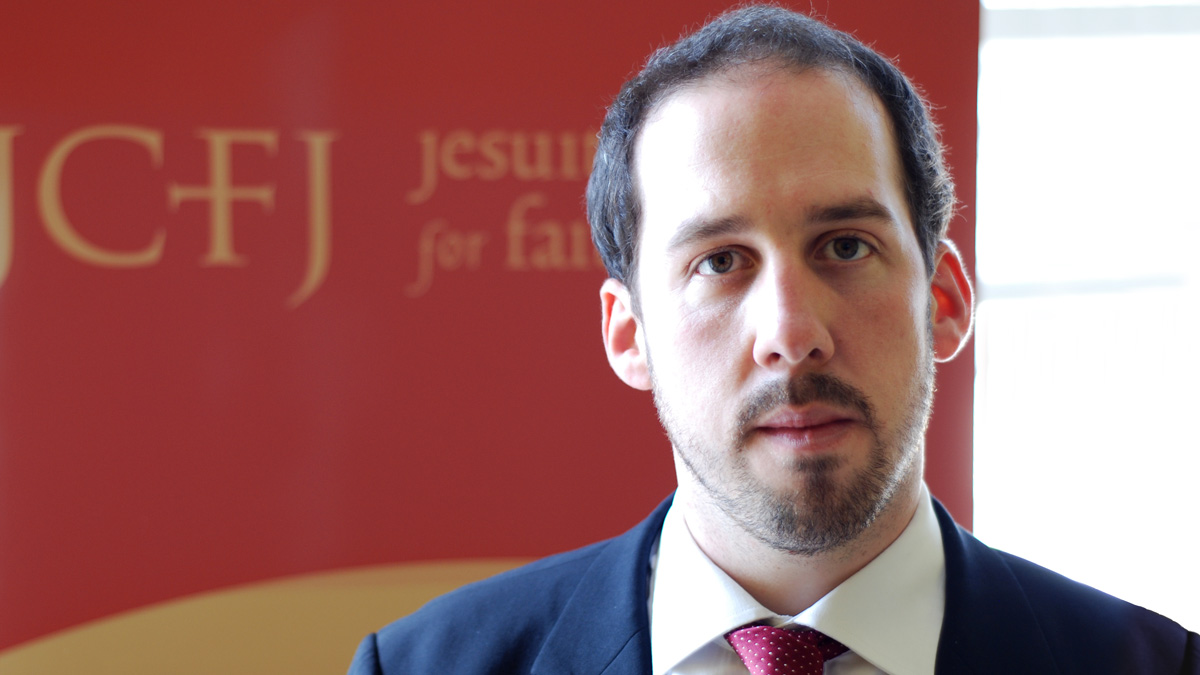The Irish Prison Service’s unmet commitments

Tackling overcrowding in cells, developing a strategy for prisoners on protection, and rolling out a cell share risk assessment, are just some of the commitments still not honoured by the Irish Prison Service, according to the Jesuit Centre for faith and Justice. The center’s advocacy officer Eoin Carroll was responding to the launch of the annual report of the Irish prison and probation services today, Monday 27 June.
On a positive note Eoin Carroll said that the Prison Service’s ‘Three Year Strategic Plan 2012–2015’ has shown imaginative and innovative developments in prison policy. “There has been a good record of achievement in a number of key areas with significant improvements in conditions in parts of Mountjoy Prison, the national roll-out of the Community Return Programme, which enables the earlier release of some prisoners under supervision. Such developments have significant positive effects for people in prison, for prison staff and for society as a whole”, he said.
Read the JCFJ’s full press release below and see their report on the needs of young adults in prison published last month.
NEWS RELEASE
IMMEDIATE, Monday, 27 June 2016
Unmet commitments as Irish Prison Service launches report and begins new strategy says Jesuit Centre for Faith and Justice
Today (27 June 2016) the Irish Prison Services and Irish Probation Service launch their Annual Reports for 2015 and Strategic Plans for 2016–2018. While considerable progress has been made, there are a number of unmet commitments from the Prison Service’s Three Year Strategic Plan 2012–2015 says Jesuit Centre for Faith and Justice.
Chronic overcrowding continues in the Dóchas Centre, Cork prison and Limerick men and women’s prison, no national roll-out of a cell share risk assessment which may have prevented the death of 21 year old Gary Douche in 2006, no overarching strategies for older prisoners and prisoners on protection and no review of the placement of 18–21 year olds with older prisoners as is currently the norm. An additional concern is the growing number of committals to prison who are women, which grew by 27.14 per cent.
Eoin Carroll, Advocacy Officer in the Jesuit Centre, said, “After conducting a follow up analysis to our comprehensive 2013 report which examined progress being made in the Irish Prison Service’s “Three Year Strategic Plan” we have identified several unmet commitments:
“Firstly, while the level of overcrowding has dramatically reduced across the prison estate over the Irish Prison Service’s previous strategic plan, chronic overcrowding persists in a number of prisons including Limerick male and female and the Dóchas Centre. The Dóchas Centre, Cork prison and Limerick men and women’s prison remained chronically overcrowded during 2015.”
“Assessing the 2015 prison figures what is of particular concern is the rising number of committals to prison that are women. Just looking at the total committal figures hides a worrying rise in the number of women being sent to prison. While total committals to prison over 2015 rose by 6.87% (men and women), the number of committals that were women rose by 27.14% (2,685 to 3,415). Historically, there was a rapid rise in the number of committals to prison up to 2010, which then levelled off and fell; however, the number of committals to prison that were women has doubled in the past five years.”
“Secondly, Gary Douche was killed in a cell in Mountjoy in 2006 at the age of 21. Had there been a ‘cell share risk assessment’ it is likely that he would not have been killed. The IPS three year plan 2012–2015 committed in year one to introduce appropriate assessment procedures on committal. The Jesuit Centre for Faith and Justice has previously argued that this needs to include a formal cell sharing risk assessment which has not been completed. Approximately 46 per cent of the prison population share a cell. It is also unfortunate that the new prison in Cork will further institutionalise cell-sharing as a feature of prison accommodation, a practice that was first formalised 30 years ago and at variance of international best practice – a particularly retrograde step.”
“Now is an opportune time to pay particular attention to young adults in prison. Over 100 young adults are on extended lock up, which the Jesuit Centre has previously referred to as ‘severe confinement’. Many are locked in their cell for 22 and 23 hours per day. The Minister for Children and Youth Affairs, Katherine Zappone should be assigned responsibility for young adults in the criminal justice system and immediately develop a plan to address their distinct needs.”
“Thirdly, the Irish Prison Service’s previous strategy committed in year one to develop specific strategies for young prisoners, women in prison, older prisoners, those convicted of a sex offence and prisoners requiring protection. While a well-developed strategy has been produced for women in prison no other plan has been published. These groups have been identified as requiring special attention and action is urgently needed. The Jesuit Centre has developed a policy paper on the needs of young adults in prison which it is hoped will inform policy in this area.”
Eoin Carroll also said:
“The Irish Prison Service’s “Three Year Strategic Plan 2012–2015” has shown imaginative and innovative developments in prison policy. There has been a good record of achievement in a number of key areas with significant improvements in conditions in parts of Mountjoy Prison, the national roll-out of the Community Return Programme, which enables the earlier release of some prisoners under supervision. Such developments have significant positive effects for people in prison, for prison staff and for society as a whole”.
[Ends]
For further information and Interview:
Eoin Carroll 01 855 6814; 087 225 0793
Advocacy Officer, Jesuit Centre for Faith and Justice
[Notes]
The Jesuit Centre for Faith and Justice is dedicated to creating a better society for all by promoting social justice and policy reform through research, theological, awareness raising and advocacy. The current policy focus of the Centre is prison policy, environmental justice and housing and homelessness. The Centre is an agency of the Irish Jesuit Province and is a registered charity: CHY 6965.
The Jesuit Centre for Faith and Justice is an agency of the Irish Jesuit Province. The Centre undertakes social analysis and reflection in relation to issues of social justice, including housing and homelessness, penal policy, environmental policy, health policy and values based economics [charitable trust. CHY 6965].












